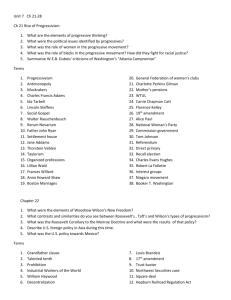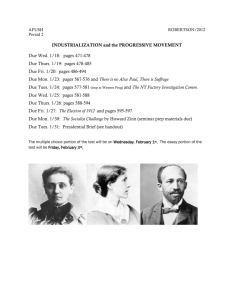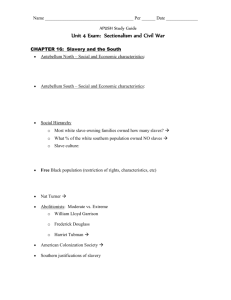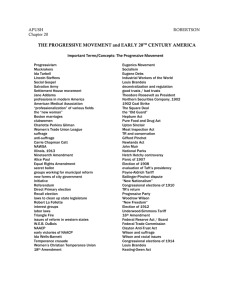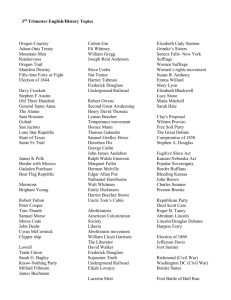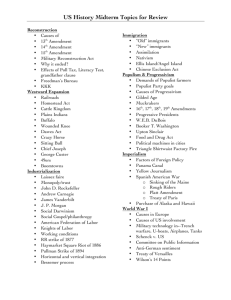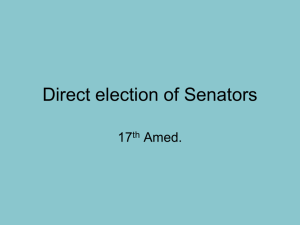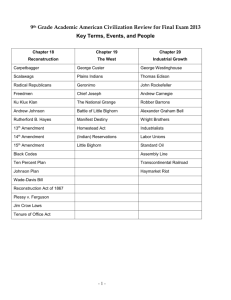APUSH Period 7 1890-1945 Vocab
advertisement
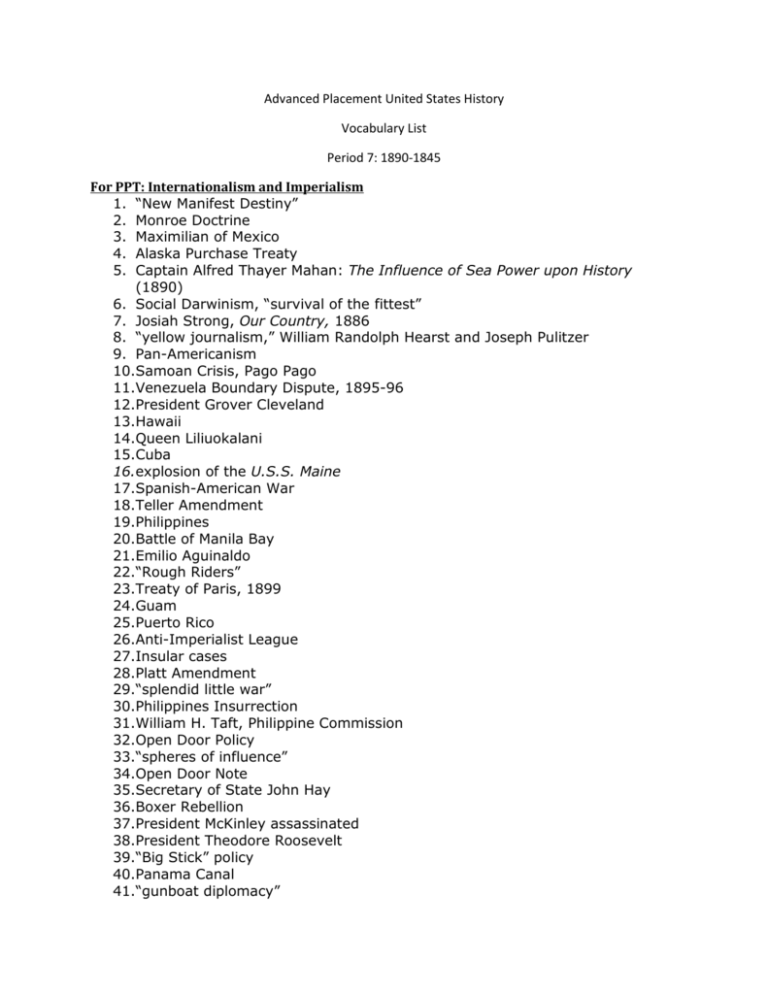
Advanced Placement United States History Vocabulary List Period 7: 1890-1845 For PPT: Internationalism and Imperialism 1. “New Manifest Destiny” 2. Monroe Doctrine 3. Maximilian of Mexico 4. Alaska Purchase Treaty 5. Captain Alfred Thayer Mahan: The Influence of Sea Power upon History (1890) 6. Social Darwinism, “survival of the fittest” 7. Josiah Strong, Our Country, 1886 8. “yellow journalism,” William Randolph Hearst and Joseph Pulitzer 9. Pan-Americanism 10.Samoan Crisis, Pago Pago 11.Venezuela Boundary Dispute, 1895-96 12.President Grover Cleveland 13.Hawaii 14.Queen Liliuokalani 15.Cuba 16.explosion of the U.S.S. Maine 17.Spanish-American War 18.Teller Amendment 19.Philippines 20.Battle of Manila Bay 21.Emilio Aguinaldo 22.“Rough Riders” 23.Treaty of Paris, 1899 24.Guam 25.Puerto Rico 26.Anti-Imperialist League 27.Insular cases 28.Platt Amendment 29.“splendid little war” 30.Philippines Insurrection 31.William H. Taft, Philippine Commission 32.Open Door Policy 33.“spheres of influence” 34.Open Door Note 35.Secretary of State John Hay 36.Boxer Rebellion 37.President McKinley assassinated 38.President Theodore Roosevelt 39.“Big Stick” policy 40.Panama Canal 41.“gunboat diplomacy” 42.Roosevelt Corollary to the Monroe Doctrine 43.Venezuela Crisis, 1900s 44.“Colossus of the North” 45.Russo-Japanese War 46.Treaty of Portsmouth 47.San Francisco School Board Incident 48.“Gentleman’s Agreement,” 1906 49.“Great White Fleet” 50.Taft’s “Dollar Diplomacy” 51.President Woodrow Wilson 52.Panama Canal Tolls Act 53.Jones Act, 1916 54.Jones Act, 1917 55.“Moral Diplomacy” 56.Mexican Revolution 57.“Pancho” Villa 58.General John J. Pershing For PPT: The Progressive Era I & II 1. Greenback Labor Party 2. Populists 3. Progressives 4. plutocracy 5. political machines 6. Jacob Riis, How the Other Half Lives 7. Social Gospel movement 8. Muckrakers 9. Lincoln Steffens, Shame of the Cities 10.Ida Tarbell 11.Upton Sinclair, The Jungle 12.David Phillips, “The Treason of the State” 13.Jane Addams, Hull House 14.Florence Kelley 15.Muller v. Oregon, 1906 16.Triangle Shirtwaist Company fire 17.Child Labor Act, 1916 18.Robert La Follette 19.“Wisconsin Experiment” 20.direct primary 21.initiative, referendum, recall 22.direct election of senators 23.17th Amendment 24.Republican “Old Guard” 25.Australian Ballot 26.commission system 27.President Theodore Roosevelt 28.“Square Deal” 29.Anthracite Coal Strike 30.Department of Commerce and Labor 31.Bureau of Corporations 32.Northern Securities Co. 33.trust busting 34.Hepburn Act, 1906 35.Meat Inspection Act, 1906 36.Pure Food and Drug Act, 1906 37.John Muir 38.Sierra Club 39.Gifford Pinchot 40.Newlands Reclamation Act, 1902 41.Panic of 1907 42.President William H. Taft 43.“rule of reason” 44.Bureau of Mines Payne-Aldrich Tariff, 1910 45.Ballinger-Pinchot controversy 46.“New Nationalism” 47.“Bull-Moose” Party 48.Election of 1912 49.“New Freedom” 50.President Woodrow Wilson 51.Eugene Debs, Socialist party 52.Industrial Workers of the World (IWW) 53.Underwood Tariff Bill, 1913 54.16th Amendment 55.Federal Reserve Act, 1913 56.Federal Trade Commission, 1914 57.Clayton Anti-trust Act, 1914 58.Louis Brandeis 59.Adkins v. Children’s Hospital, 1923 60.18th Amendment 61.Volstead Act, 1920 62.National American Women’s Suffrage Association 63.Carrie Chapman Catt, “Winning Plan” 64.Alice Paul 65.19th Amendment 66.Equal Rights Amendment (ERA) 67.Chicago Race Riot, 1919 68.Ida B. Wells-Barnett 69.Booker T. Washington 70.W. E. B. Du Bois 71.Niagara Movement 72.“talented tenth” 73.NAACP, National Association for the Advancement of Colored People 74.D.W. Griffith, Birth of a Nation 75.Ku Klux Klan 76. eugenics For PPT: World War I 1. Central Powers, Triple Alliance 2. Allies, Triple Entente 3. Britain’s naval blockade 4. President Woodrow Wilson 5. Lusitania 6. Sussex Ultimatum 7. Election of 1816 8. unrestricted submarine warfare 9. Zimmerman Note 10.“Make the world safe for democracy” 11.“War to end all wars” 12.Fourteen Points 13.Creel Committee, Committee on Public Information 14.Espionage Act, 1917 15.Sedition Act, 1918 16.International Workers of the World (IWW) 17.Eugene Debs 18.Schenck v. U.S., 1918 19.Oliver Wendell Holmes, Jr. 20.War Industries Board 21.Nineteenth Amendment 22.The “Great Migration” 23.National War Labor Board 24.Herbert Hoover 25.Food Administration 26.voluntary compliance 27.18th Amendment 28.Bond drives, Liberty Loans 29.Selective Service Act 30.Archangel expedition 31.Western Front 32.American Expeditionary Force (AEF) 33.General John J. “Black Jack” Pershing 34.Meuse-Argonne Offensive 35.Paris Peace Conference 36.Big Four 37.League of Nations 38.mandates 39.Article X 40.Article 231 41.“self-determination” 42.Henry Cabot Lodge 43.“Irreconcilables” 44.Lodge Reservations 45.Election of 1920 46.“normalcy” 47.President Warren G. Harding 48. isolationism For PPT: American Society in the 1920s 1. radical 2. anarchy 3. communism 4. socialism 5. conservative 6. reactionary 7. liberal 8. “Americanism” 9. “Red Scare” 10.Billy Sunday 11.Seattle General Strike 12.Boston Police Strike 13.steel strike 14.United Mine Workers 15.John L. Lewis 16.Palmer Raids A. Mitchell Palmer 17.American Legion 18.Sacco and Vanzetti case 19.Ku Klux Klan 20.Birth of a Nation, D. W. Griffith 21.nativism 22.Immigration Act of 1921 23.National Origins Act, 1924 24.Scopes “Monkey” Trial 25.fundamentalism 26.American Civil Liberties Union (ACLU) 27.Clarence Darrow 28.William Jennings Bryan 29.Prohibition 30.18th Amendment 31.Volstead Act, 1919 32.“bootlegging” 33.Al Capone 34.speakeasies 35.mass-consumption economy 36.Bruce Barton, The Man Nobody Knows 37.“trickle down” tax policies 38.“buy now, pay later” 39.white-collar workers 40.advertising 41.scientific management 42.Frederick W. Taylor 43.assembly line 44.Henry Ford 45.Model-T 46.airplane 47.Wright Brothers 48.Charles Lindbergh 49.Amelia Earhart 50.radio 51.KDKA 52.movies 53.Hollywood 54.Cecil B. De Mille 55.The Jazz Singer 56.welfare capitalism 57.sexual revolution 58.Dr. Sigmund Freud 59.flapper 60.Margaret Sanger 61.Alice Paul 62.Equal Rights Amendment (ERA) 63.Jazz 64.Louis Armstrong 65.Harlem Renaissance 66.Langston Hughes 67.Claude McKay 68.Countee Cullen 69.Zora Neale Hurston 70.Marcus Garvey 71.United Negro Improvement Association 72.The “Lost Generation” 73.H. L. Mencken, American Mercury 74.F. Scott Fitzgerald, This Side of Paradise; The Great Gatsby 75.Theodore Dreiser, An American Tragedy 76.Ernest Hemingway, The Sun Also Rises, Farewell to Arms 77.Sinclair Lewis, Main Street; Babbitt For PPT: The Politics of the 1920s 1. election of 1920 2. isolationism 3. President Warren G. Harding 4. “normalcy” 5. Andrew Mellon, Treasury Secretary 6. Herbert Hoover, Commerce Secretary 7. “trickle-down” economics 8. Fordney-McCumber Tariff 9. trade associations 10.McNary-Haugen Bill 11.Isolationism 12.Election of 1928 13.Al Smith 14.President Herbert Hoover 15.bull market 16.bear market 17.on margin buying of stocks overspeculation 18.Great Crash of 1929 (“Black Tuesday”) 19.overproduction 20.underconsumption 21.runs on banks 22.Hawley-Smoot Tariff, 1930 23.Great Depression 24.deflation 25.“Hoovervilles” 26.Agricultural Marketing Act, 1929 27.Federal Farm Board 28.debt moratorium 29.Reconstruction Finance Corporation 30.Norris-LaGuardia Anti-Injunction Act 31.Bonus Army For PPT: The New Deal 1. Franklin D. Roosevelt 2. Eleanor Roosevelt 3. election of 1932 4. 21st Amendment 5. New Deal 6. “Brain Trust” 7. Francis Perkins, Secretary of Labor 8. “First Hundred Days” 9. fireside chats 10.Relief, Recovery, Reform: “3 Rs” 11.“First New Deal” 12.“bank holiday” 13.Emergency Banking Relief Act 14.Home Owners Loan Corporation (HOLC) 15.Glass-Steagall Banking Reform Act 16.Federal Deposit Insurance Corporation (FDIC) 17.Securities and Exchange Commission 18.Civilian Conservation Corps (CCC) 19.Federal Emergency Relief Administration (FERA) 20.Harry Hopkins 21.“dole” payments 22.Civilian Works Administration (CWA) 23.Public Works Administration (PWA) 24.Works Progress Administration (WPA) 25.Federal Arts Project 26.National Youth Administration (NYA) 27.Agricultural Adjustment Administration (AAA) 28.subsidies 29.Butler v. U.S., 1935 30.Dust Bowl 31.John Steinbeck, The Grapes of Wrath 32.Rural Electrification Administration (REA) 33.National Industrial Recovery Act (NIRA) 34.Section 7(a) 35.National Recovery Administration (NRA) 36.“Blue Eagle” 37.Schechter v. U.S., 1935 38.Wagner Act (National Labor Relations Act) 39.Congress of Industrial Organizations (CIO) 40.John L. Lewis 41.sit-down strike, Flint Michigan 42.Fair Labor Standards Act 43.Tennessee Valley Authority (TVA) 44.Federal Housing Authority (FHA) 45.“red-lining” 46.Aid to Families with Dependent Children (AFDC) 47.Indian Reorganization Act 48.American Liberty League 49.Father Charles Coughlin 50.Huey P. Long, “Share Our Wealth” 51.Dr. Francis Townsend 52.Social Security Act 53.“Second New Deal” 54.1936 elections 55.new Democratic coalition 56.Judiciary Reorganization Bill, 1937 57.“court packing” 58.Recession of 1937-38 59.John Maynard Keynes 60.deficit spending 61.“conservative coalition” For PPT: Isolationism and the Road to WWII (1920-1941) 1. 2. 3. 4. 5. 6. 7. 8. 9. isolationism Washington Naval Conference Five-Power Treaty reparations Ruhr Crisis Dawes Plan Kellogg-Briand Pact Great Depression Mexican Oil Crisis 10.Dwight D. Morrow 11.“Good Neighbor” policy 12.Montevideo Conference 13.Buenos Aires Convention 14.Tydings-McDuffie Act 15.Reciprocal Trade Agreements Act 16.Secretary of State Cordell Hull 17.totalitarianism 18.fascism 19.Benito Mussolini 20.Adolf Hitler, Nazi Party 21.communism 22.Joseph Stalin 23.Japan’s invasion of Manchuria 24.Hoover-Stimson Doctrine 25.Tripartite Pact: Rome-Berlin-Tokyo Axis 26.Italy’s invasion of Ethiopia 27.London Economic Conference 28.Nye Committee 29.Neutrality Acts 30.“cash and carry” 31.Spanish Civil War 32.Rome-Berlin Axis 33.Panay incident 34.“Quarantine” Speech 35.Neville Chamberlain 36.appeasement 37.pacifism 38.Sudetenland 39.Munich Conference 40.invasion of Czechoslovakia 41.German-Soviet Non-Aggression Pact 42.invasion of Poland 43.Blitzkrieg 44.Fall of France 45.Battle of Britain 46.German invasion of the Soviet Union 47.Neutrality Act of 1939 48.“Arsenal of Democracy” Speech 49.Havana Conference 50.Destroyer-Bases Deal 51.Winston Churchill 52.Internationalism 53.Committee to Defend America by Aiding the Allies 54.America First Committee 55.Charles Lindbergh 56.election of 1940 57.“Four Freedoms” Speech 58.Lend-Lease Act 59.“shoot on sight” policy 60.Atlantic Charter 61.“Greater East Asia Co-Prosperity Sphere” 62.Tripartite Pact: Rome-Berlin-Tokyo Axis 63.Hideki Tojo 64.Pearl Harbor For PPT: The US in World War II 1. Pearl Harbor 2. Home Front 3. WACs 4. WAVES 5. Tuskegee Airmen 6. 442nd Regiment Combat Team 7. Navajo “code talkers” 8. War Production Board (WPD) 9. “Rosie the Riveter” 10.Sunbelt 11.War Labor Board 12.Office of Price Administration (OPA) 13.Smith-Connelly Anti-Strike Act 14.John L. Lewis 15.Manhattan Project 16.J. Robert Oppenheimer 17.Detroit Race Riot A. Philip Randolph 18.March On Washington Movement 19.FEPC (Fair Employment Practices Commission) 20.Bracero Program 21.Zoot Suit Riots 22.Japanese internment 23.Executive Order 9066 24.Issei 25.Nisei 26.Korematsu v. U.S. (1944) 27.Grand Alliance 28.Bataan Death March 29.Battle of Stalingrad 30.Battle of El Alamein 31.“Operation Torch” 32.Dwight D. Eisenhower 33.D-Day, invasion of Normandy 34.Battle of the Bulge 35.Battle of Midway 36.Island Hopping 37.Okinawa 38.Iwo Jima 39.election of 1944 40.death of FDR 41.President Harry Truman 42.Potsdam Conference 43.Hiroshima 44.Nagasaki 45.Casablanca Conference 46.Chang Kai-shek (Jiang Jieshi) 47.Tehran Conference 48.Yalta Conference 49.Holocaust, “Final Solution”
